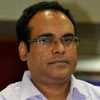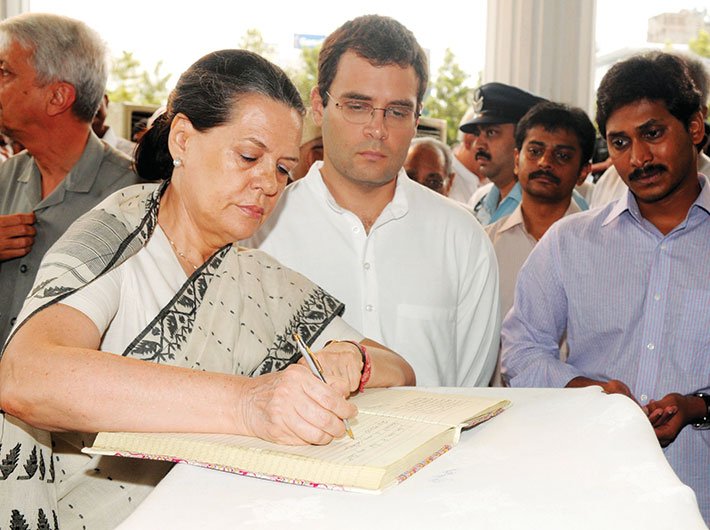The Grand Old Party is floundering. The abysmal performance in the assembly elections has seemingly sounded the death knell for the party. It is perhaps time for auscultation
On May 19, after the results of the assembly elections were announced, Congress vice president Rahul Gandhi tweeted, “We will work harder till we win the confidence & trust of people.” But these confident words sounded rhetorical when you remember his reaction after the defeat in the Delhi assembly election in 2013.
“We have the ability to transform ourselves and the Congress party is going to do that,” he said on December 8, 2013, while accepting the defeat of Congress after 15 years in Delhi. “We will learn from them [Aam Aadmi Party], and we will involve people in a way that no one has ever done before,” he added.
But these warrior-like words couldn’t change the ground reality and the party faced its worst defeat in the 2014 parliamentary election. And in May 2016, the country’s grand old party was reduced to ruling just six states. Even loyalists like Digvijaya Singh are demanding ‘surgery’ and the leadership ability of Sonia Gandhi and Rahul Gandhi is under attack.
Is it really a problem of leadership or the reason behind this drubbing lies somewhere else? Most of the Congressmen have forgotten the meaning of Congress. They seemingly don’t know what principles the party stands for.
Vijay Bahuguna, son of stalwart Hemvati Nandan Bahuguna and former chief minister of Uttarakhand, took no time to join the BJP. There is a long list of MPs and MLAs who left the Congress overnight and got a poll ticket from BJP. They started praising the Rashtriya Swayamsevak Sangh (RSS), whom they had earlier accused for the murder of Mahatma Gandhi. Does it mean that the Congress has stopped energising and enriching its cadres by ideology? Or has the gap between Congress and BJP become so narrow that one can cross it by taking a small step?
The motivational force of any vibrant party could only be a ‘dream’ – RSS cadres have a dream of Hindu Rashtra, communists still dream of a red flag on top of the Red Fort, Aam Aadmi Party workers want to end corruption and mass base of the Bahujan Samaj Party (BSP) has a dream of a casteless society. But what about the Congress? What is its dream which can motivate its cadres?
Think of the days when the Congress party ruled the heart of the people across India. The Congress was not any ordinary party, but the dream of a modern India. Its leadership made India the only country in the third world that moved forward with the flag of democracy, instead of dictatorship, after getting independence from the colonial power. The founding fathers refused the two-nation theory of Jinnah and Savarkar and made India a secular state, despite all the pressures that led to the birth of a religion-based nation, Pakistan.
Being a Congressman essentially means being a follower of Mahatma Gandhi and practising the philosophy of simple living and high thinking. The idea of secularism, socialism, plurality and equality are not just slogans, but a matter of faith for them. The Congress was like a rainbow. Every colour of the society had a space there. Dalits, Muslims and tribals had full faith in the party and they were confident that it would fulfil all the promises which were made during the freedom struggle. Party cadres were present in every platform of the society to propagate the beliefs and ideology of the Congress.
In Jawaharlal Nehru’s time, secularism and socialism were not mere tactics to woo the voters, but strong beliefs. In 1939, when Subhas Chandra Bose was the Congress president, it was decided that members of the Muslim League and Hindu Mahasabha could not be the members of the Congress anymore. Under Nehru’s leadership, the party never hesitated to challenge the communal forces. Whether it was the issue of cow slaughter or the Hindu code bill, the party stood with the modern and rational outlook of the constitution.
Inner party democracy was not a mere slogan. There were several cabinet ministers who never hesitated to contradict Nehru on several issues. Even his son-in-law and firebrand Congress MP, Feroze Gandhi, several times took the lead in attacking the government’s policies. Issues of corruption like the Mundhra case are examples of his commitment. No one could ever think that his son Rajiv Gandhi would one day become the prime minister and face allegations of bribery in the Bofors deal.
But after Nehru, things changed quickly. Indira Gandhi had broken up the grand old party on the leadership issue and changed the Congress into ‘Indira Congress’. Congress(I) was basically the party of loyalists. There were party presidents like DK Barooah who coined the famous “Indira is India and India is Indira” slogan. The Gandhi family became the central motivational force in a very short period. The declaration of Emergency was the first big assault on the basics of the republic and a popular people movement under the leadership of Jayaprakash Narayan ended the three-decade long rule of the Congress at the centre. Due to opportunism of the Janata Party leaders, Indira Gandhi, also called the Iron Lady, managed to return in two and a half years only, but with a change.
The party started using the soft Hindu card and in the time of the Khalistan movement, it became the centre for Hindu polarisation. The Ram temple movement started in the 1980s and opening up the lock of Babri Masjid and permission for shilanyas in Ayodhya by the Rajiv Gandhi government gave an ideological edge to the RSS and its related organisations. On the other hand, the Rajiv Gandhi government overturned the decision of the supreme court in the Shah Bano case. It became a symbol of appeasement of Muslims. Despite a hue and cry regarding appeasement, the Sachar commission found that the condition of Muslims in India is not better than dalits.
Muslims also felt cheated by the failure of consecutive Congress governments to control riots. After the Babri Masjid episode, voting for the Congress became a question of tactics instead of commitment. When regional parties strongly emerged on the ground of social justice in the states like UP and Bihar, they voted for them. Emergence of BSP was a big jolt for the Congress as dalits became its mass base in no time. The radical questions raised by BR Ambedkar were never answered by the Congress. The idea of a casteless society and representation of dalits in leadership had no place in the minds of most of the Congress leaders who were mainly upper caste Hindus. Kanshi Ram made it a big issue and dalits distanced themselves from the Congress in a big way.
New economic policies adopted by the Narasimha Rao government were just a reversal of the socialist resolution of the Congress. A new India was born and a successful growth story was scripted by Manmohan Singh. But, it was also the first time that farmers started committing suicide. Interestingly, BJP which gave the slogan of ‘Congress-mukt Bharat’ (India without Congress) has completely adopted the economic policies of the Congress. In a place like Bastar, scheduled tribes are facing a war-like situation under the BJP regime through ‘Operation Green Hunt’, which was started by the UPA. This creates a lot of confusion among the party workers. They are unable to understand what difference it makes, if they are in Congress and not in BJP.
Senior Congress leader and former home minister P Chidambaram has suggested presenting a collective leadership and reconstituting the Congress committees at the block level. The point, however, is how a party can build a robust grassroot organisation without a clear vision.
On the 25th death anniversary of Rajiv Gandhi, Congress president Sonia Gandhi said that “no failure is permanent” if one sticks to the principles. But, what those principles are and what they should be is not an issue meant to be dealt by the Congress workers. The leadership should know that. A party without a dream is just like a party without a ‘theme’ and it can have no impact.
feedback@governancenow.com
(The column appears in the June 1-15, 2016 issue of Governance Now)

